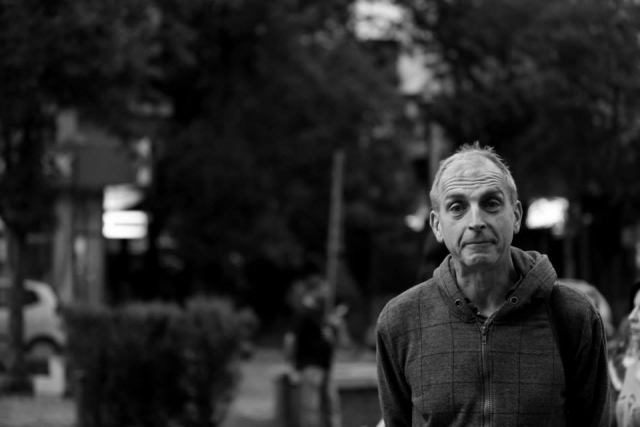Photo: Vasil Garnizov
Anastasia Balezdrova
Two months after the start of the protests against Oresharski’s government, GRReporter is continuing to closely monitor their development with the comments of Professor Nikolai Slatinski, social anthropologist Vasil Garnizov, journalist Ivan Bedrov and many others
Today our interlocutor is Ivaylo Ditchev, Professor of Cultural Anthropology at Sofia University "St. Kliment Ohridski", who works in the field of political culture, and media and urban studies. He is also a writer and a prominent essayist, and the winner of awards like "Panitza", "Chernorizetz Hrabar" and "Dimitar Peshev."
The interview with Professor Ditchev was conducted via chat on the social network Facebook.
The protests are currently subsiding. Is this due only to the summer holidays or is there another reason?
The summer protests have failed to build a bridge to the winter ones which were against the electricity bills and which were mass protests actually, Sofia has not involved the country.
The main reason is that the summer protests have failed to build a bridge to the winter ones which were against the electricity bills and which were mass protests actually, Sofia has not involved the country. Social movements are like a bicycle – you either go forward or fall down, i.e. they need to expand to survive. The last slogan they raised here was against the budget adjustment. Can you imagine this? The whole of Europe, Greece in the first place, are protesting against budget constraints whereas it is just the opposite in Bulgaria - the protest wants budget constraints. Such a cause is not very popular, as you can imagine. However, it is not too late for the discontent to grow. Our economy is seasonal and the situation worsens in the autumn. The only thing left for the organizers of the protests in Sofia is to realize that they will not be able to overthrow the government alone and that they need to open up to the demands of a much wider range of people.
Where has the protest succeeded and where has it failed after more than two months in the street?
It has been able to stop the appointment of Peevski, drive the right-wing parties to overcome their stupid discord and unite in a reformist bloc, introduce a completely new standard of control over the government and to discredit the "New Media Coalition" (the "New Bulgarian Media Group" of Irena Krasteva and Delian Peevski – author’s note). It has been able to politicize part of society... It has failed to appoint leaders, programmes and to give directions for the development of Bulgaria. For example, the separation of big business from the state, which they want now and which they wanted in February, is still wishful thinking. It is because the government has not withdrawn the money from the bank, which is managing the country; the protests have not been able to put an end to feudal tenure, change the system of public procurement, ban the participation of offshore companies in the interaction with the state. It would be better if these things happen now, before the fall of the government, because we do not know what the next government will do. I am deliberately avoiding mentioning the resignation, either as a failure or as success. It is important for me but it is not the only important point of the present developments.

Professor Ditchev at the protest outside the Council of Ministers, photo: Vasil Garnizov
As you have mentioned, the protesters have failed to nominate a leader or to unite around one person. What are the advantages and disadvantages of protests as a form of public reaction?
The protesters are stating that the absence of leaders is making them less vulnerable. This is a double-edged sword because, sooner or later, a leader must appear on the scene who is to change things. And, if he or she has not been “checked” over the years, if he or she has not built relations on the basis of loyalty and trust, then the moment of his or her appearance becomes difficult or even impossible.
We are entering an era of constant discontent, everywhere and regarding all matters. This was the same with the movement of the Indignados (outraged) in Spain, with the Occupy movement in the USA. Each government will have to consider this pressure and this is fine although it is a little hard to imagine how underdeveloped countries like ours will be governed under such powerful pressure. The protesters are stating that the absence of leaders is making them less vulnerable. This is a double-edged sword because, sooner or later, a leader must appear on the scene who is to change things. And, if he or she has not been “checked” over the years, if he or she has not built relations on the basis of loyalty and trust, then the moment of his or her appearance becomes difficult or even impossible. So I do not believe that significant changes will happen here and elsewhere in the world: it is just that the political processes will go faster, no one will wait for four years to trust / distrust the government, it will have to react instantly, explain its actions and withdraw its decisions. This is the better option in my opinion although the majority of our compatriots who expect a "system restart," new morality, revision of the transition etc. will be disappointed. In politics, big jumps usually mean catastrophes whereas good things come in small steps.